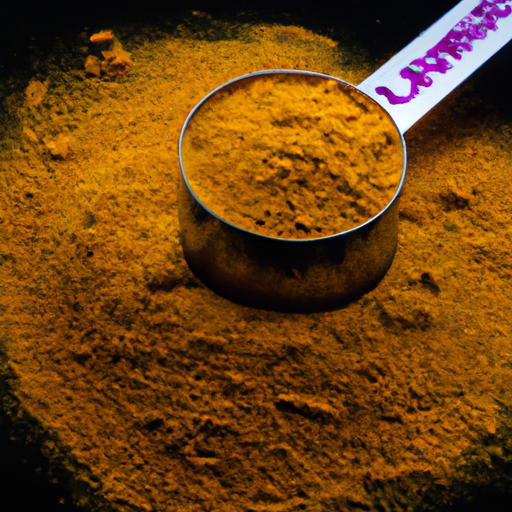I adore turmeric tea; it’s like a cozy embrace on a chilly winter day. Besides its delightful flavor, I value its potential health perks. Turmeric, often found in Indian dishes, includes curcumin, a compound with anti-inflammatory and antioxidant qualities. Consuming turmeric tea regularly is associated with decreasing inflammation, enhancing digestion, and possibly warding off specific illnesses.
However, like many natural remedies, the question remains: how long does it take for turmeric tea to work? Well, the answer is not straightforward, as several factors can affect the efficacy and timeline of experiencing the benefits of turmeric tea.
In this article, I’ll delve into the science behind turmeric tea, explore the different factors that can influence its effectiveness, and provide tips for maximizing its potential. So, grab a cup of turmeric tea, and let’s dive in!
Key Takeaways
- Turmeric tea contains curcumin, an anti-inflammatory and antioxidant compound that can improve digestion, reduce inflammation, and potentially prevent certain diseases.
- To enhance the bioavailability of curcumin, turmeric is often combined with black pepper and fat.
- Brewing techniques, such as the amount of black pepper and fat added, can affect the efficacy of turmeric tea.
- Using fresh turmeric root and simmering for at least 15 minutes allows for maximum absorption of curcumin, and adding ginger, honey, cinnamon, or lemon juice can enhance its benefits.
Understanding the Science Behind Turmeric Tea
Let’s dive into the science behind turmeric tea and find out how this golden elixir works its magic!
Turmeric contains a bioactive compound called curcumin, which is responsible for its anti-inflammatory and antioxidant properties. Curcumin has been studied extensively for its potential health benefits, including reducing the risk of chronic diseases like cancer and Alzheimer’s.
To get the most out of turmeric tea, it’s important to understand its compounds, benefits, and potential risks. While curcumin is the primary active ingredient in turmeric, it’s not easily absorbed by the body on its own. To enhance its bioavailability, turmeric is often combined with black pepper, which contains a compound called piperine that enhances the absorption of curcumin.
Additionally, brewing techniques can also affect the efficacy of turmeric tea. To optimize the extraction of the active compounds, it’s recommended to simmer turmeric root in water for at least 10-15 minutes before adding other ingredients.
Now let’s move on to the next section and explore the factors that affect the efficacy of turmeric tea.
Factors that Affect the Efficacy of Turmeric Tea
There are various factors that can significantly impact the potency of turmeric tea, from the freshness of the ingredients to the brewing method used. One key factor that affects the efficacy of turmeric tea is the amount of black pepper added. Black pepper contains piperine, a compound that enhances the absorption of curcumin, the active ingredient in turmeric. Studies suggest that adding just a pinch of black pepper to turmeric tea can increase the bioavailability of curcumin by up to 2000%.
Other factors that affect absorption include the presence of fat in the drink, as curcumin is fat-soluble, and the way the tea is consumed, as taking it with food can also improve absorption. In terms of dosage, it’s recommended to consume no more than 1-2 teaspoons of turmeric per day, as excessive consumption can lead to side effects such as digestive issues and liver damage.
It’s also important to note that the effects of turmeric tea may vary depending on the individual’s health status and lifestyle factors, such as diet and exercise. Therefore, it’s advisable to consult with a healthcare professional before incorporating turmeric tea into your daily routine. With these factors in mind, let’s explore the timeline for experiencing the benefits of turmeric tea.
Timeline for Experiencing the Benefits of Turmeric Tea
I’ve been drinking turmeric tea for a few weeks now, and I’ve noticed some changes in my body.
In this discussion, I want to explore the timeline for experiencing the benefits of turmeric tea. Specifically, I’ll be looking at the short-term effects, long-term effects, and how consistency and patience play a role in seeing results.
Through researching and personal experience, I hope to provide insight into what you can expect when drinking turmeric tea regularly.
Short-Term Effects
You’ll start feeling the short-term effects of turmeric tea within the first few sips, such as a boost in energy and reduced inflammation. Turmeric contains curcumin, a compound known for its anti-inflammatory properties. This means that when you drink turmeric tea, it can help reduce inflammation in your body, leading to less pain and discomfort.
Additionally, curcumin has been shown to boost energy levels, making turmeric tea a great alternative to coffee or other caffeinated beverages. While turmeric tea is generally considered safe, there are some potential risks associated with consuming too much of it.
One of the immediate effects of turmeric tea is that it can cause an upset stomach or diarrhea in some people, especially if they consume large quantities. It’s also important to note that turmeric can interact with certain medications, so it’s always a good idea to speak with your healthcare provider before incorporating it into your routine.
As you continue to drink turmeric tea, you may start to experience some longer-term effects, such as improved cognitive function and reduced risk of chronic diseases. But before we dive into those benefits, let’s explore the potential risks associated with long-term consumption of turmeric tea.
Long-Term Effects
To enjoy the long-term benefits of drinking turmeric tea, make sure to speak with your healthcare provider to ensure it’s safe for you. But don’t worry, incorporating it into your routine can be a simple and delicious addition to your day.
Turmeric contains compounds that have anti-inflammatory and antioxidant properties, which can benefit your overall health in a number of ways. For example, turmeric tea has been found to support healthy digestion, improve skin health, and even potentially prevent certain types of cancer.
Studies have shown that turmeric’s active compound, curcumin, can help reduce inflammation in the digestive system, which can alleviate symptoms of conditions like irritable bowel syndrome. Additionally, curcumin has been found to have skin-protective properties, reducing the signs of aging and improving skin elasticity.
Research has also indicated that turmeric tea may play a role in cancer prevention, with some studies suggesting that it may help slow the growth of cancer cells. Incorporating turmeric tea into your routine for these benefits may take time, but consistency and patience can lead to positive long-term effects.
Consistency and Patience
Don’t give up on incorporating turmeric into your routine, even if you don’t see immediate results. Consistency is key when it comes to reaping the benefits of turmeric tea.
While some people may experience noticeable changes in their health after just a few days of drinking turmeric tea, others may not see any significant changes for a few weeks. It’s important to remember that everyone’s body is different, and it may take some time for turmeric to work its magic.
If you’re struggling with the wait, there are some patience strategies you can try. First, remind yourself of the potential benefits of turmeric tea, such as reducing inflammation, boosting immunity, and improving digestion. These benefits may not be immediately visible, but they can have a positive impact on your overall health in the long run.
Additionally, try to incorporate other healthy habits into your routine, such as exercise and a balanced diet, to support the effects of turmeric tea. With consistency and patience, you’ll be able to maximize the potential of turmeric tea and experience its full benefits.
Next, let’s explore some tips for maximizing the potential of turmeric tea.
Tips for Maximizing the Potential of Turmeric Tea
When it comes to maximizing the potential of turmeric tea, I’ve found that pairing it with other ingredients can enhance its benefits. For example, adding ginger or honey can help with digestion and add flavor. Additionally, adding a small amount of black pepper can increase the absorption of curcumin, the active ingredient in turmeric.
Finally, it’s important to avoid common mistakes such as using old or low-quality turmeric, using too much or too little, or not steeping it for long enough. By following these tips, you can ensure that you’re getting the most out of your turmeric tea.
Pairing with Other Ingredients
You can jazz up your turmeric tea by adding a pinch of cinnamon, which pairs perfectly with the warm and earthy flavors of turmeric. Mixing options are endless when it comes to turmeric tea, but adding cinnamon is a great starting point.
Here are a few other combinations that can provide added benefits:
- Ginger: This root has anti-inflammatory properties similar to turmeric, so combining the two can help reduce inflammation and improve digestion.
- Honey: Not only does honey add a touch of sweetness to your tea, but it also has antibacterial properties that can boost your immune system.
- Lemon: Adding lemon juice to your turmeric tea can help your body better absorb the curcumin, the active ingredient in turmeric that provides many of its health benefits.
- Coconut milk: Coconut milk is rich in healthy fats that can help improve brain function and reduce inflammation. Plus, it adds a creamy texture to your tea.
In addition to these mixing options, it’s also important to consider adding black pepper to your turmeric tea. Black pepper contains piperine, a compound that enhances the bioavailability of curcumin, making it easier for your body to absorb and utilize.
With the right combinations, turmeric tea can be a delicious and healthful addition to your daily routine.
Adding Black Pepper
To enhance the benefits of your turmeric tea, try sprinkling a little black pepper into the mix and watch as the flavors come alive. Black pepper is not only a great flavor enhancer, but it also contains a compound called piperine, which has been found to increase the absorption of curcumin, the active ingredient in turmeric, by up to 2000%.
This means that adding black pepper may help increase the bioavailability of the turmeric, allowing your body to absorb more of its beneficial properties. If you’re not a fan of black pepper, there are other alternatives you can try. Ginger, for example, has been found to have similar bio-enhancing properties as black pepper and can be a great addition to your turmeric tea.
Additionally, adding a healthy fat like coconut oil or ghee can also help increase the absorption of curcumin. So next time you make your turmeric tea, don’t forget to experiment with different ingredients to find the perfect combination for your taste buds and health goals.
Now that we’ve covered the benefits of adding black pepper or other alternatives to your turmeric tea, let’s move on to the next section where we’ll discuss some common mistakes to avoid when making turmeric tea.
Avoiding Common Mistakes
To avoid common mistakes when making turmeric tea, it’s important to use fresh turmeric root instead of powdered turmeric. Powdered turmeric may be more convenient, but it loses its potency over time. Fresh turmeric root has higher levels of curcumin, which is the active ingredient that provides the health benefits of turmeric. It also has a more vibrant color and flavor than powdered turmeric.
When preparing turmeric tea, it’s important to use the right preparation techniques. Here are some common mistakes to avoid:
-
Not simmering the roots long enough: Simmering the turmeric root for at least 15 minutes allows the curcumin to be released and absorbed into the tea.
-
Adding too much honey: Although honey can be a natural sweetener, adding too much can overpower the flavor of the turmeric. Start with a small amount and adjust as needed.
-
Straining the tea too soon: It’s important to let the tea simmer for the full 15 minutes and then let it steep for an additional 5 minutes before straining. This ensures that all the curcumin is extracted from the turmeric root.
By avoiding these common mistakes, you can ensure that your turmeric tea is both flavorful and beneficial for your health.
Frequently Asked Questions
Can turmeric tea be consumed by pregnant women?
Oh, absolutely! Turmeric tea is a great way to support fertility during pregnancy. It’s been shown to have anti-inflammatory properties that can help reduce the risk of complications. So, drink up and enjoy the benefits of turmeric tea!
How much turmeric powder should be added to make a cup of turmeric tea?
To make a cup of turmeric tea, I usually add 1 teaspoon of turmeric powder to boiling water and let it steep for 10 minutes. Brewing tips include adding black pepper to enhance absorption and using fresh ingredients for optimal flavor.
Is it safe to consume turmeric tea on an empty stomach?
Consuming turmeric tea on an empty stomach can have both benefits and side effects. While it may aid digestion and boost immunity, it may also cause acid reflux and stomach upset. It’s important to consult with a healthcare professional before incorporating it into your routine.
Can turmeric tea be consumed with other medications?
Interactions between turmeric and medications can occur, so it’s important to discuss with a healthcare provider before consuming turmeric tea. Dosage accuracy is also crucial to avoid potential adverse effects.
How long can turmeric tea be stored and still retain its efficacy?
The shelf life of turmeric tea depends on storage conditions. When stored properly in an airtight container, it can be effective for up to six months. Avoid exposure to heat, light, and moisture to maintain its efficacy.
Conclusion
In conclusion, turmeric tea is a natural and effective way to boost your overall health and well-being. It contains powerful antioxidants and anti-inflammatory compounds that can help to prevent and treat a wide range of health conditions. However, the efficacy of turmeric tea can be affected by a variety of factors, including the quality of the turmeric used, the brewing method, and the dosage.
If you’re looking to experience the benefits of turmeric tea, it’s important to be patient and consistent. According to research, it can take anywhere from a few weeks to several months to start seeing significant improvements in your health. So, if you’re looking for a natural way to improve your health, turmeric tea is definitely worth trying.
One interesting statistic to note is that turmeric is the fourth best-selling botanical dietary supplement in the United States, with sales reaching over $50 million annually. This shows that many people are turning to natural remedies like turmeric to improve their health and well-being.
So, why not join the millions of people who are experiencing the benefits of this powerful spice? Try incorporating turmeric tea into your daily routine and see how it can improve your health and vitality.










